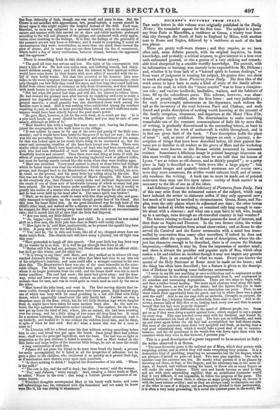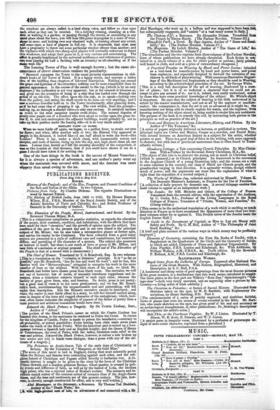DICKENS ' S PICTURES PROM ITALY.
THE early letters in this volume were originally published in the Daily News; the remainder appear for the first time. The subject is a jour- ney from Paris to Marseilles, a residence at Genoa, a wintry tour from that city through the North of Italy to England by Milan, with another tour to Rome and Naples, followed by a residence at each of the last two places.
These are pretty well-worn themes ; and they require, as we have often said, some definite pursuit, with its original inquiries, its fresh knowledge, and probably a critical acumen, to give interest to a tour over such exhausted ground, or else a genius of a very striking and remark- able kind sharpened by a sensible worldly knowledge. The pursuit, with its information or learning, was scarcely to be expected from Mr. Dickens ; and, whether it be from lack of a " learned spirit in human dealings," or from want of judgment in treating his subject, his genius does not show to much advantage in these Pieturesfront Italy. The first idea of the work seems to have been to make a kind of story of the family adven- tures on the road, in which the "brave courier" was to bear a conspicu- ous role ; and various landlords, landladies, waiters, and the habituds of kw, fill up the subordinate parts. This scheme, however, was aban- doned, or greatly modified, after the first letter : and very judiciously ; for such overwrought minuteness as the departure, such tedious de- tail as the inventory of the road between Paris and Chalons, and such forced and prolix description of nothing worth knowing as the account of the family reception, treatment, and departure at the Hotel l'Ecu d'Or, was perhaps rarely exhibited. The determination to make something remarkable out of the constant commonplaces of daily life by mere dint of writing, is gradually discontinued in the succeeding letters, at least to some degree; but the trick of authorcraft is visible throughout, and is in fact one great fault of the book. " Pure description holds the place of sense"; and, as must of necessity happen on such a journey, a de- scription Of things that have been described before, till their general fea- tures are as familiar to all readers as the grove of Mars and the workshop of Vulcan were known to the Roman satirist tormented by incessant reciters. Sometimes a felicitous image in pointed language impresses an idea more vividly on the mind,—as when we are told that the houses of Lyons "are as rotten as old cheeses, and as thickly peopled" ; or a petty place in Italy is described as a " little town like a large pigsty " : but such quaint images and quaintly-turned sentences are of course rare ; were they more numerous, the artifice would exhaust itself; and of neces- sity condense the writing. A book can no more be made out of pointed sentences than man can live upon spices : variety of fresh matter is as necessary to the life of one as of the other. And deficiency of matter is the deficiency of Pictures front Italy. Part of this may arise from the exhausted nature of the subject, which may have induced the writer to elaborate trifles if they only appeared new; but much of it must be ascribed to circumstances. Genoa, Rome, and Na" plea, were the only places where he sojourned any time; the other towns he either looked at whilst waiting, or remained only long enough to ram- ble about with a cicerone; and what can a man have to tell, who, boxed up in a carriage, runs through an oft-travelled country in bad weather? The letters relating to Genoa and Rome possess the most of interest, and then those on Naples and Florence. In the two former cities, the writer picked up some information from actual observation ; and at iome he obi served the Carnival and the Easter ceremonies with a mind less tram- melled by convention than many other travellers, if indeed he does not sometimes affect the opposite. In all cases of description, where the ob- ject has character enough to be described, there is of course the Dickens impression,—different, it may be, from the impression of another mind ; and there is always the peculiar and popular style of Boz, which often makes a hit and realizes an incident though it may not impart any generic novelty. Here is an example of what we mean. Every one knows the ascent of the Holy Staircase at Rome must be made on the knees ; and the thing has often been described ; but a feature is given to the descrip- tion of Dickens by marking some ludicrous occurrences. "I never in my life saw anything at once so ridiculous and so unpleasant as this sight: ridiculous in the absurd incidents inseparable from it, and uneisasant in
its senseless and unmeaning degradation. There are two steps to 'n with, and then a rather broad landing. The more rigid climbers went along land-
ing on their knees, as well as up the stairs; and the figures. they cut in their. shuffling progress over the level surface no description can paint. Then, to see them watch their opportunity from the porch, and cut in where there was a place next the wall! And to see one man with an umbrella, (brought on purpose, for it was a fine day,) hoisting himself, unlawfully, from stair to stair! And to ob- serve a demure lady of fifty-five or so, looking back every now and then to assure herself that her legs were properly disposed ! " There were such odd differences in the speed of different people, too. Some got on as if they were doing a match against time; others stopped to say a prayer on every step. This man touched every stair with his forehead, and kissed it;' that man scratched his bead all the way. The boys got on brilliantly, and were up and down again before the old lady had accomplished her half-dozen stairs. But most of the penitents came down very sprightly and fresh, as having done s real good substantial deed, which it would take a good deal of sin to counter- balance; and the old gentleman in the watch-box was down upon them with his cannister while they were in this humour, I promise you."
This is a good description of a game supposed to be as ancient as Italy r the writer observed it at Genoa.
"The most favourite game is the national one of Mora, which they pursue with surprising ardour, and at which they will stake everything they possess. It is a destructive kind of gambling, requiring no accessories but the ten fingers, which are always—I intend no pun—at hand. Two men play together. One calls a number—say the extreme one, ten. He marks what portion of it he pleases by throwing out three, or four, or five fingers; and his adversary has, in the same in- stant, at hazard, and without seeing his hand, to throw out as many fingers as will make the exact balance. Their eyes and hands become so used to this, and act with such astonishing rapidity, that an uninitiated bystander would find it very difficult, if not impossible, to follow the progress of the game. The initiated, however, of whom there is always an eager group looking on, devour it with the most intense avidity; and as they are always ready to champion one side or the other in case of a dispute, and are frequently divided in their partisanship, it -is often a very noisy proceeding. It is never the quietest game in the world; for. the numbers are always called in a loud sharp voice, and follow as close upon each other as they can be counted. On a holyday evening, standing at a win- dow, or walking in a garden, or passing through the streets, or sauntering in any ilet place about the town, you will hear this game in progress in a score of wine- at once; and looking over any vineyard walk, or turning almost any corner, come upon a knot of players in full cry. It is observable that most men have a propensity to throw out some particular number oftener than another; and the vigilance with which two sharp-eyed players will mutually endeavour to detect this weakness, and adapt their game to it is very curious and entertaining. The effect is greatly heightened by the universal suddenness and vehemence of gesture; two men playinf for half a farthing with an intensity as all-absorbing as if the stake were life.
The Leaning Tower of Pisa is well enough known ; but the same cir- cumstance of clever observation realizes its peculiarity.
" Sismondi compares the Tower to the usual pictorial representations in chil- dren's books of the Tower of Babel. It is a happy simile, and conveys a better idea of the building than chapters of laboured description. Nothing can exceed the grace and lightness of the structure; nothing can be more remarkable than its general appearance. In the course of the ascent to the top, (which is by an easy staircase,) the inclination is not very apparent; but at the summit it becomes so, and gives one the sensation of being in a ship that has heeled over through the action of an ebb-tide. The effect upon the low side, so to speak—looking over from the gallery, and seeing the shaft recede to its base—is very startling; and I arm a nervous traveller hold on to the Tower involuntarily, after glancing down, as if he had some idea of propping it up. The view within, from the ground- huking up, as through a sleeted tube—is also very curious. It certainly inclines as much as the most sanguine tourist could desire. The natural impulse of ninety-nine people out of a hundred who were about to recline upon the grass he- ftier it, to rest and contemplate the adjacent buildings, would probably be, not to tee up their position tinder the leaning side—it is so very much aslant."
2,15rA2rr VIEW' OF BONE.
When we were fairly of again, we began, in a perfect fever, to strain oureyes for Rome; and when, after another mile or two, the Eternal City appeared at length in the distance, it looked like—I sin half afraid to write the word—like London ! There it lay, under a thick cloud, with innumerable towers and steeples, and roofs of houses, rising up into the sky, and, high above them all, one dome. I swear that, keen/7 as I felt the seeming absurdity of the comparison, it was so like London at that distance, that if you could have shown it me in a glass I should have taken it for nothing else.
One of the beet things in the book is the ascent of Mount Vesuvius ; for it is always a species of adventure, and our author's party went up When the mountain was covered with snow, and the descent was more slippery than usual owing to the ice.



























 Previous page
Previous page